Enterprise Scheduling Comes to XM Cloud: SiteCron Cloud Launches on Sitecore’s Intelligent DXP Marketplace
Akshay Sura - Partner
15 Aug 2025
Yesterday marked the official public release of the Sitecore Marketplace and its accompanying SDK, opening the doors for developers everywhere to create and share powerful integrations and apps. I’m especially excited about this milestone because I had the privilege of participating in the early access program, where I developed SiteCron Cloud, a modern, cloud-ready version of my popular SiteCron scheduling module designed specifically for use with Sitecore XM Cloud. Being part of the early build process allowed me to explore the new SDK’s capabilities firsthand and ensure SiteCron Cloud is optimized to deliver scheduling power in a SaaS-native environment.
SiteCron for Sitecore XP/XM
SiteCron is a Sitecore scheduling module that I developed, based on Quartz.NET, designed for defining and managing cron-expression-based scheduled jobs directly within the Sitecore interface. SiteCron leverages Quartz’s CronTrigger functionality to execute complex or straightforward scheduled tasks reliably. The module is distributed through GitHub and NuGet (latest version 3.8.0, updated August 14, 2025). It supports a range of Sitecore versions, including compatibility up to Sitecore 10.4, and has been widely used to automate tasks such as publishing, data syncs, indexing, and custom integrations.
Here are some helpful links if you want to get started on your Sitecore Marketplace App:
- Sitecore Marketplace Documentation
- Sitecore Marketplace SDK for JavaScript
- Blok Design System
- Building Modern Sitecore Marketplace Apps: A Developer's Complete Guide
- Unlocking the Sitecore Marketplace: A Deep Dive from SUGCON Europe 2025
Back to SiteCron Cloud ;)
Building a SaaS version of the SiteCron scheduler was interesting to say the least. The best part was when I got to speak with Justin Vogt about the architecture of the Marketplace apps.
Architecture
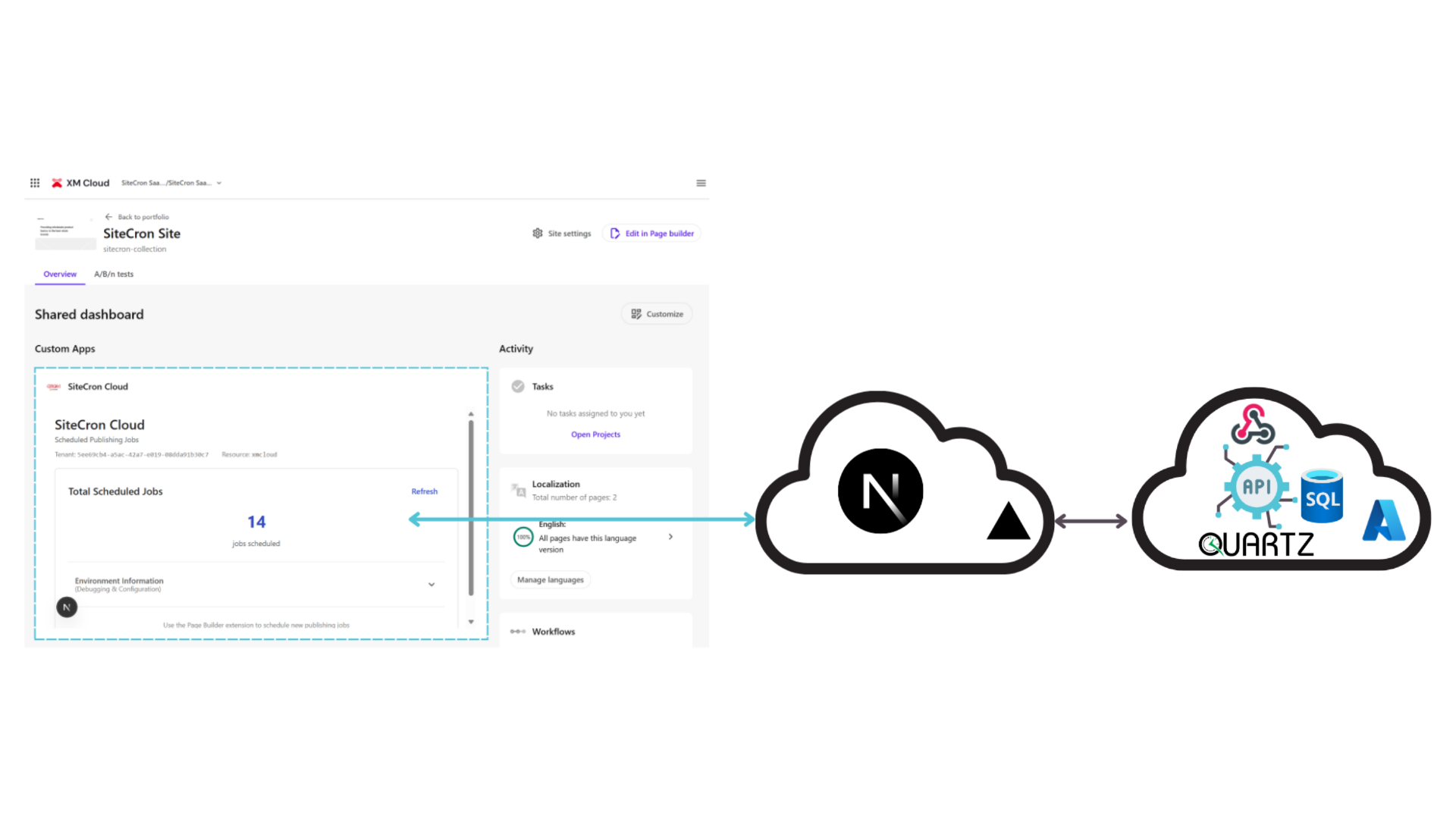
The architecture for SiteCron Cloud follows a clean separation of concerns, leveraging modern cloud technologies and the Sitecore Marketplace SDK to deliver a robust, scalable scheduling solution for XM Cloud.
At its core, the application is a Next.js front end built using the Blok Design System. This provides the user interface and consumes the context data made available by the Marketplace SDK, including any authentication needed to access other Sitecore APIs securely. We’ve hosted this front end on our Vercel instance for fast, scalable delivery.
Frontend Layer: Next.js with Blok Design System
The user interface is built as a Next.js application using Sitecore's Blok Design System, ensuring a consistent look and feel that seamlessly integrates with the XM Cloud experience. This frontend application:
- Marketplace SDK Integration: Utilizes the context provided by the Sitecore Marketplace SDK for authentication, tenant, and site information
- Multi-Context Embedding: Designed to be embedded in multiple XM Cloud locations:
- Dashboard widget for centralized scheduling management, currently shows the count of scheduled tasks for the whole tenant
- Page context panel Integration for page-specific scheduling interactions - currently allows you to schedule the page multiple times, with more features to come.
- Authentication Flow: Leverages the marketplace context for secure access to other Sitecore APIs
- Hosting: Deployed on Vercel for optimal performance and global distribution
These extension points are handled via different routes in the Next.js application.
API Layer: Azure-Hosted Backend Services
The backend is deployed as an Azure Web App, providing the core scheduling engine and business logic:
Core Functionality
- Multi-Tenant Architecture: Handles multiple tenants and projects with isolated data and job execution.
- Quartz.NET Integration: Leverages the proven Quartz.NET framework for reliable job scheduling and execution
- Storage Layer: Manages persistent storage for tenant configurations, project settings, and job definitions
- Job Orchestration: Responsible for triggering and monitoring scheduled jobs across different tenants
Current Job Types
The system currently supports two primary job types, with an extensible architecture for future enhancements:
Webhook Jobs
- Trigger HTTP webhooks based on cron expressions
- Configurable payload support for flexible integrations
- Perfect for connecting XM Cloud to external systems and services
Publish Item Jobs
- Automated content publishing within XM Cloud
- Cron-based scheduling for precise timing control
Security and Authentication
The architecture prioritizes security through:
- Marketplace SDK Authentication: Leverages Sitecore's secure authentication flow
- Tenant Isolation: Each tenant's data and jobs are completely isolated
- API Security: Secure communication between frontend and backend layers
Dashboard Widget: Centralized Scheduling Command Center
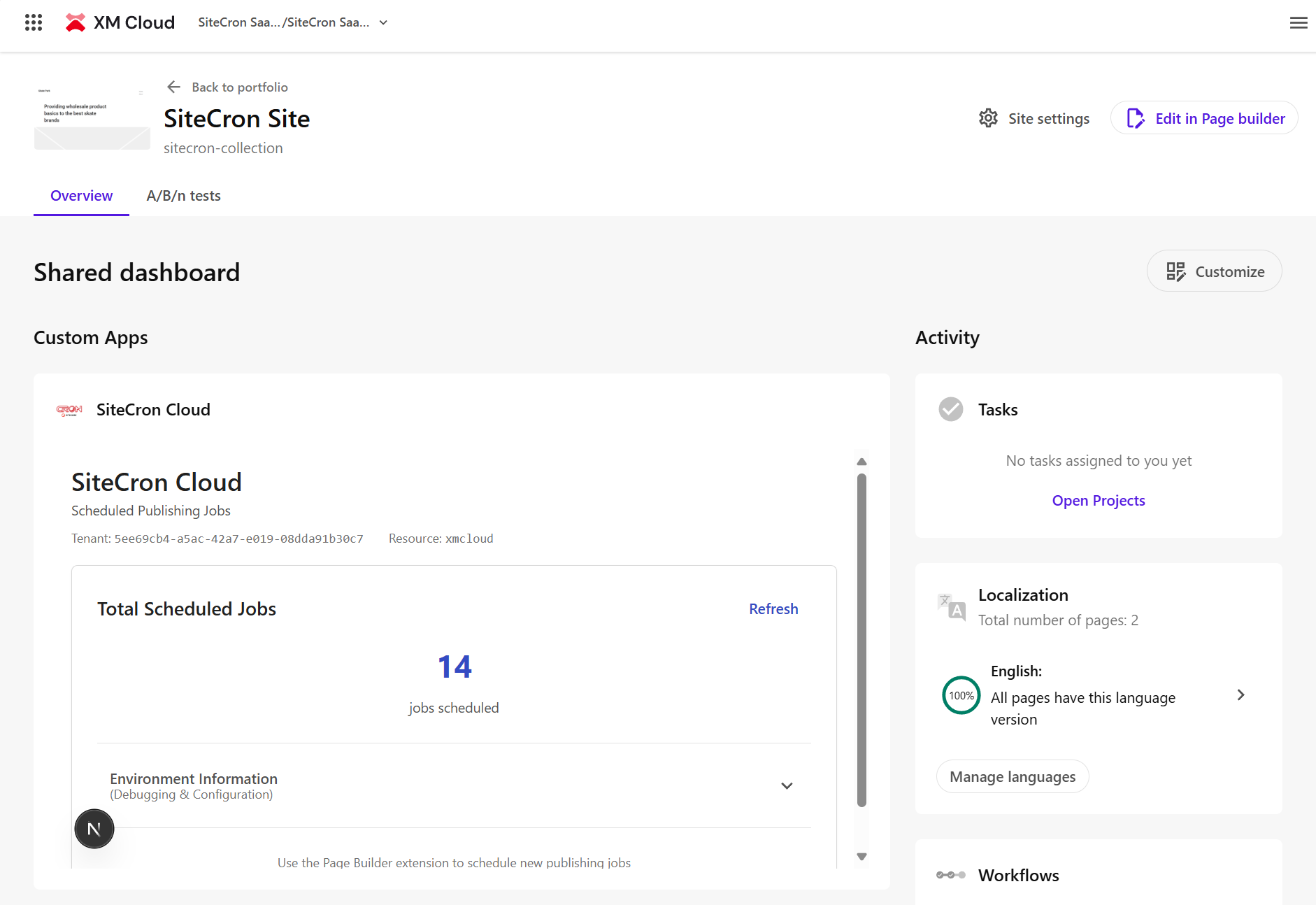
The primary dashboard widget serves as the central hub for tenant-wide scheduling management. Currently, it provides:
- Real-time Job Count: Displays the total number of scheduled tasks across the entire tenant
Future Dashboard Enhancements
The widget architecture is designed for expansion, with planned features including:
- At-a-Glance Status: Quick visibility into scheduling activity without diving into individual projects
- Tenant-Level Overview: Aggregated view that helps administrators understand overall scheduling load
- Job Monitoring Dashboard: Real-time status of running, completed, and failed jobs with visual indicators
- Job Re-execution Controls: One-click job retry functionality for failed or missed executions
- Performance Analytics: Historical job execution data, success rates, and performance trends
- Bulk Operations: Tenant-wide job management capabilities like pause/resume all jobs or bulk schedule modifications
- Alert Management: Configurable notifications for job failures, long-running tasks, or unusual patterns
Context Panel Extensions: Content-Aware Scheduling
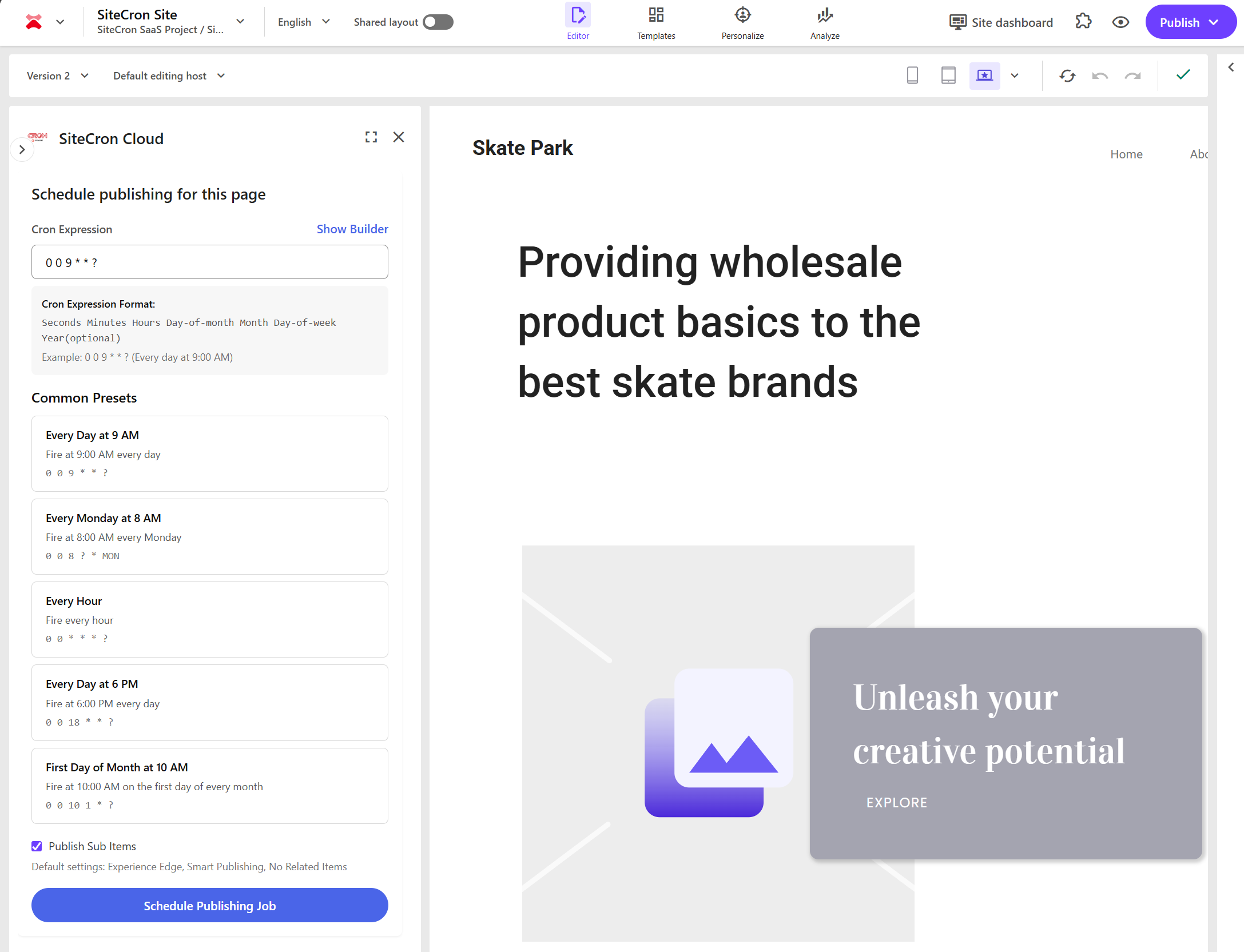
The page context panel integration brings scheduling capabilities directly into the content editing workflow, providing contextual automation tools where editors need them most.
Current Context Panel Features
- Multi-Schedule Publishing: Schedule the current page for multiple future publication times with a single interface
- Page-Specific Context: Automatically inherits page information, eliminating manual configuration
- Inline Workflow Integration: Seamlessly fits into existing content creation and editing processes
- Quick Schedule Creation: Streamlined interface optimized for rapid scheduling decisions
Future Context Panel Enhancements
The contextual nature of this integration opens up powerful content-centric automation possibilities:
Advanced Publishing Controls
- Conditional Publishing: Schedule publishing based on content completion status, approval workflows, or external triggers
- Multi-Language Scheduling: Coordinate publishing across language versions with intelligent dependency management
- Rollback Scheduling: Pre-schedule content rollbacks or version switches for time-sensitive campaigns
Content Lifecycle Automation
- Expiration Management: Schedule automatic content archiving, unpublishing, or removal based on business rules
- Workflow Triggers: Automatically advance content through approval workflows at scheduled times
- Review Reminders: Schedule notifications for content reviews, updates, or compliance checks
Campaign & Marketing Integration
- Campaign Orchestration: Coordinate page publishing with marketing campaigns, social media posts, and email sends
- A/B Testing Automation: Schedule content variant switches for automated testing scenarios
- Seasonal Content Management: Bulk scheduling for holiday content, promotional periods, or event-driven updates
Analytics & Optimization
- Content Refresh Automation: Automatically schedule content reviews and updates based on age or performance metrics
- SEO Optimization Scheduling: Coordinate content updates with SEO campaigns and keyword strategies
The context panel integration transforms scheduling from a separate administrative task into a natural part of the content creation process, making automation accessible to editors and content managers rather than just technical administrators.
Community Focus
The launch of SiteCron Cloud is just the beginning. As the Sitecore Marketplace ecosystem grows and XM Cloud continues to evolve, I'm excited to expand SiteCron Cloud's capabilities based on community feedback and real-world use cases.
From the early days of SiteCron for traditional Sitecore to today's cloud-native SiteCron Cloud, this journey represents everything I love about the Sitecore community: identifying real problems, building solutions, and sharing them with fellow developers.
Ready to bring enterprise scheduling to your XM Cloud implementation? Get in touch to learn more about how Konabos can help you implement XM Cloud and SiteCron Cloud.

Akshay Sura
Akshay is a nine-time Sitecore MVP and a two-time Kontent.ai. In addition to his work as a solution architect, Akshay is also one of the founders of SUGCON North America 2015, SUGCON India 2018 & 2019, Unofficial Sitecore Training, and Sitecore Slack.
Akshay founded and continues to run the Sitecore Hackathon. As one of the founding partners of Konabos Consulting, Akshay will continue to work with clients to lead projects and mentor their existing teams.

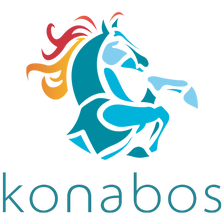
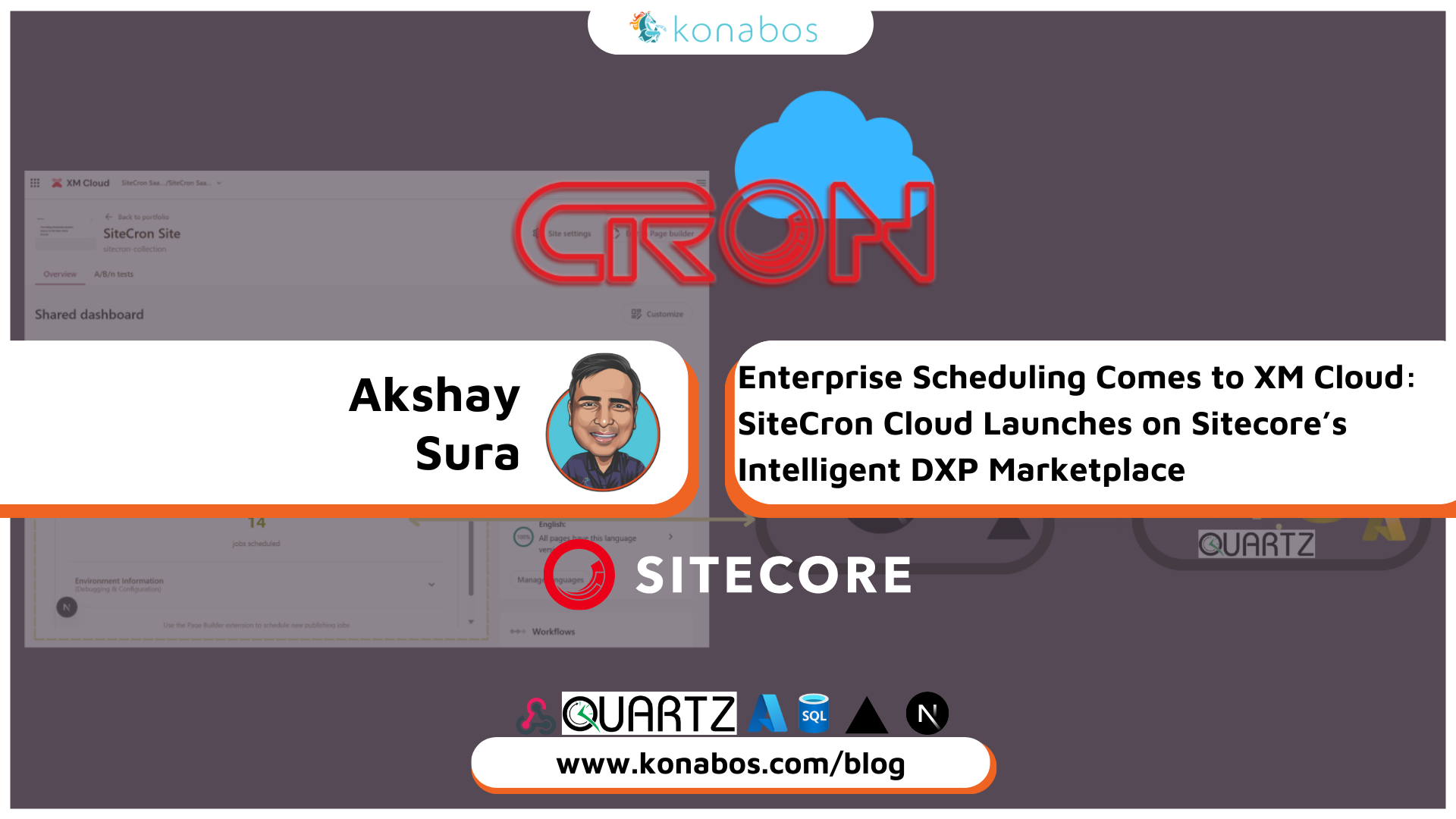
Share on social media